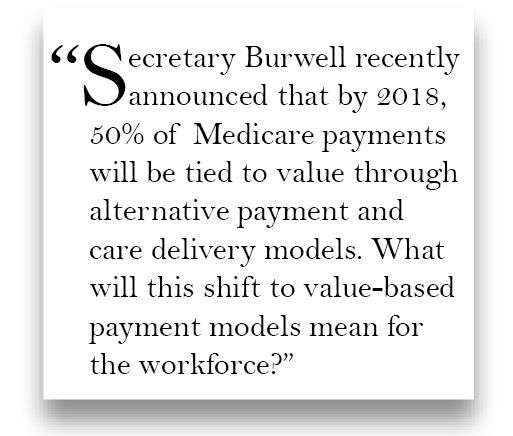Workforce Transformations Needed to Staff Value-Based Models of Care (2013-14)
 Authors: Erin Fraher, PhD, MPP, Rachel Machta, BS, Jacqueline Halladay, MD, MPH
Authors: Erin Fraher, PhD, MPP, Rachel Machta, BS, Jacqueline Halladay, MD, MPH
Abstract: Secretary Burwell recently announced that by 2018, 50% of Medicare payments will be tied to value through alternative payment and care delivery models. What will this shift to value-based payment models mean for the workforce? This paper synthesizes the existing body of evidence on the workforce implications of new models of care. We identify: 1. task shifting that is occurring in the delivery of traditional health care services; 2. new staff roles that are emerging to provide enhanced care services; 3. how employers are “putting it all together”; and 4. the implications of these trends for health workforce research and policy.
Key Findings: Health care professionals are taking on new roles with medical assistants having one of the most rapidly evolving roles in new models of care. New roles are emerging that focus on: 1) coordinating and managing patients’ care within the health care system; and 2) “boundary spanning” functions that address the patient’s health care needs across health and community‐based settings. Employers are struggling to rewrite or create new job descriptions, reconfigure workflows, and develop training to support task shifting and new roles. Health workforce researchers and policy makers need to shift focus from “old school” to “new school” approaches. Specifically, they need to shift focus from: 1) workforce shortages to developing a better understanding of how the existing workforce could be redeployed and reconfigured to address the demand‐capacity mismatch; 2) provider type to provider role because different types of health care providers can take on the same roles; and 3) training new professionals to retooling the existing workforce since they will be the ones who will transform care.
- Fraher E, Ricketts TC. Building a Value-Based Workforce in North Carolina. North Carolina Medical Journal. 2016; 77(2):94-8.
- Fraher EP, Ricketts TC, Lefebvre A, Newton W. The Role of Academic Health Centers and Their Partners in Reconfiguring and Retooling the Existing Workforce to Practice in a Transformed Health System. Academic Medicine. 2013; 88(12):1812-1816.
- Ricketts TC, Fraher EP. Reconfiguring health workforce policy so that education, training, and actual delivery are closely connected. Health Affairs. 2013 November; 32 (11).
- Fraher E, Machta R, Halladay J. The Workforce Transformations Needed to Staff Value-Based Models of Care. Research Brief. November 2015.
- Fraher E. Workforce Planning for a Rapidly Changing Healthcare System. Webinar, American Hospital Association. November 1, 2017.
- Fraher E. The Nursing Workforce: Navigating through Transformative Health System Change. Webinar, Vanderbilt Center for Interdisciplinary Studies. January 20, 2016.
- Fraher EP. How Can We Transform the Workforce to Meet the Needs of a Transformed Health System? Keynote presentation, AAMA Annual Conference. September 18, 2015. Portland, OR.
- Fraher E, Richman E, Gaul K. The Nursing Workforce in North Carolina: Challenges and Opportunities. Presentation, Robert Wood Johnson Foundation Meeting: Rural Health: Finding Creative Solutions Together. Denver, CO. June 29, 2015.
- Fraher EP, Halladay J, Machta R. How Can We Transform the Workforce to Meet the Needs of a Transformed Health System? Poster. AcademyHealth Annual Research Meeting. June 15, 2015. Minneapolis, MN.
- Fraher E, Ricketts TC. Building a Value-Based Workforce in North Carolina. Presentation, AAMC Health Workforce Research Conference. May 2015. Washington, DC.
- Brandt B, Fraher E. How Many Doctors, Nurses, and Other Professionals Do You Need? The Impact of New Delivery System Models on Your State’s Workforce Needs. Presentation, National Governors Association. April 22, 2015. Washington, DC.
- Fraher EP, Richman EL, Gaul K. The Nursing Workforce: Navigating through Transformative Health System Change. Presentation, Regionally Increasing Baccalaureate Nurses’ (RIBN): The RIBN Journey: Into the future. March 17, 2015. Greensboro, NC.
- Ricketts TC. Numbers and Workforce Policies. Keynote presentation, UNC Dental School Research Day. February 25, 2015. Chapel Hill, NC.
- Fraher EP. 2015. The workforce needed to staff value based models of care. Presentation, National Health Policy Forum. February 20, 2015. Washington, DC.
- Gaul K, Fraher E. The Health System is Transforming: Now What? Presentation, Ohio MEDTAPP Summit: Transforming Healthcare Through State-University Partnerships. September 23, 2014. Columbus, OH.
- Fraher E, Machta R, Morrison M. How Can We Transform the Workforce to Meet the Needs of a Transformed Health System? Webinar, Health Workforce Technical Assistance Center. April 9, 2014.
- Fraher E. How Can We Transform the Workforce to Meet the Needs of a Transformed Health System? Presentation, North Carolina Community College System, Continuing Education Leadership Institute. March 25, 2014. Raleigh, NC.
- Fraher E. Are We Preparing the Allied Health Workforce North Carolina Will Need Now and in the Future? Presentation, NC Community College System. November 12, 2013. Raleigh, NC.
- Fraher E. Are we Preparing the Allied Health Workforce North Carolina Will Need Now and in the Future? Presentation, Council for Allied Health in NC. October 16, 2013. Chapel Hill, NC.
You must be logged in to post a comment.